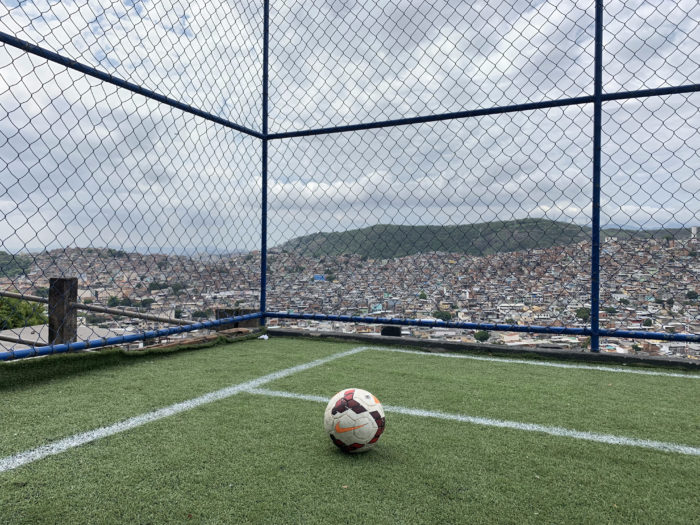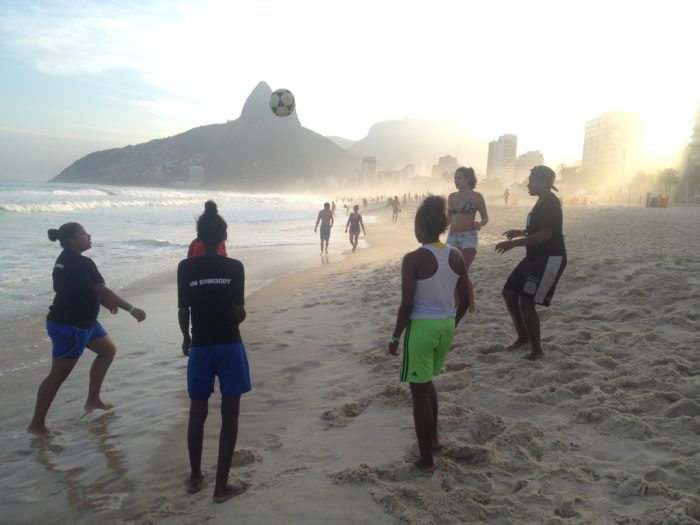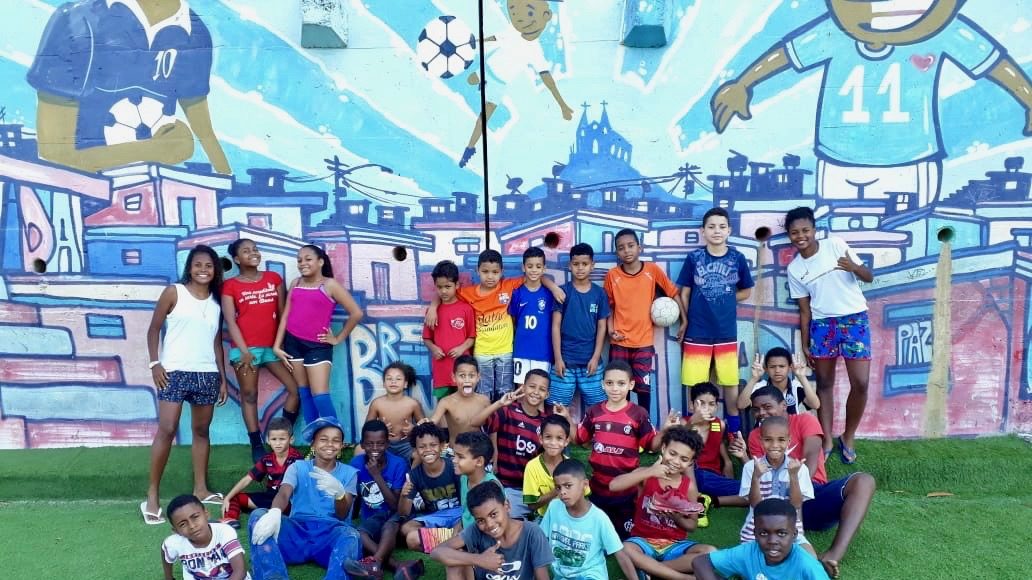From the football pitch perched precariously on a hillside in Penha, you can see thousands of small brick homes stretching to the mountains in the distance. But the pitch doesn’t just offer the best view of the favela complex, it’s at the heart of efforts to help young people not just survive but thrive during the crisis in Rio de Janeiro.As coronavirus has swept the Brazilian city – with poorer favela areas that are home to around a quarter of Rio’s 13 million people hardest hit – the sport for development project run by Street Child United Brazil has had to adapt to ensure the 300 children who usually access the pitch stay safe and protected – not just from coronavirus.

Isolation amid the virus has led to depression and anxiety for many young people stuck in overcrowded homes where financial and other pressures are compounded by new fears about poor sanitation, lack of hand-washing facilities, medical care and insecure work. Even during the pandemic police raids of many favelas have continued.
Ana Clara Ferreira da Silva, who would usually attend football coaching sessions on the pitch, says: “it has been a really difficult time for me and for everyone who used to go the pitch to play football. Apart from being a place where we could go to play, it was a refuge where we went to leave our problems at home. It has been really tough for us not to meet there and talk to each other.”
Joe Hewitt, a Briton and former Rio resident who today helps organise the project from afar, said: “We followed local government recommendations and had to halt community play because of the lockdown. The coaches immediately set up a network to communicate by zoom and started offering weekly physical and mental wellbeing sessions, especially helping those without phones.
“The coaches focused on ensuring that the children felt they had each other and the coaches to talk to as we know that pressures have built up at home during the lockdown.”
Before the virus swept Rio, around 45 children a day were attending sessions at the football pitch, which is also where they usually gather to take part in art activities, celebrations and other community events. For many children in an area blighted by high levels of gun violence between police and local drugs gangs, it is a place where they can play and develop safely. Shootouts are frequent in Penha but fortunately the pitch is largely off-limits.
Led by Adam Reid, a Scot and long-time resident of Rio, the three young coaches employed to teach football sessions have also coordinated the project’s efforts to deliver donations of soap, food and other essentials to the vulnerable in this working-class area. Playing a part in this effort has boosted pride and acceptance between the generations in Penha, says Reid.
In 2018 he took a teenage girls’ team from Penha to Moscow for the 10-day Street Child World Cup for marginalised children from around the world. They brought home the trophy. It was the second victory for the girls from Penha, who defeated girls’ teams from six countries in the earlier tournament in 2014.
The football pitch is a legacy from that event, which was held before the FIFA championship in Brazil and brought visitors and professional footballers like former Arsenal Invincible Gilberto Silva to the pitch high on the hill in Penha.
Six years on, the visitors may have left but Reid is still determined to open the world to the children from an area where families face a high level of social exclusion.
“We can’t take every child abroad of course, but they all know that we can provide some opportunities for them to go to other areas and have new experiences, and that we have done this for many kids in the community,” says Reid, who has developed a SCUB partnership with the British School in Rio and arranges training and job opportunities with employers in the city for the young people.
Claudianny Santos, one of the three coaches, says ‘The work that SCUB is doing during the pandemic is keeping the children united and active, because doing sports builds up physical immunity and will make them less vulnerable to Covid. Since we can’t do the usual training sessions outside, we have been coaching the children via Zoom – and in this way we are helping them stay alert to the risks while they are at home – and protected.’

Despite the limitations of the virus, Reid and his colleagues are also preparing for a new development phase for SCUB when lockdown eventually lifts. Artistic director Renato Rocha will lead a programme he calls “Playing Field – the community as a team”, a methodology that uses “arts and sports metaphors for social change and community engagement” in the favela complex, he says.
Rocha says: “The objective of the project is to is to help our kids develop their talents and potential, to promote inter-generational integration in the community of Penha and via untold stories to reimagine their community.”
The activity of reimagining their community as a place of potential will add another dimension to the pitch on the hillside in Penha, which was rebuilt last year with funds raised in Rio and some help from the Favela Foundation in London, after storms and police raids tore the Astroturf and turned it into a scrubby patch of land.
Reid is also looking into landscaping options for the land around this field of dreams, with one idea to create a garden where children can grow their own food.
For now, however, the main thing is that children can soon return and sports and arts activities are being organised so everyone can maintain a safe distance, says Hewitt.
“For us it is about physical not social distancing. This will always be a place where everyone can come together.”
The Favela Foundation is a London-based organisation set up in 2017 to contribute to grassroots projects in the favelas of Rio.
Readers can donate directly to the work of SCUB here.
Jo Griffin is a freelance journalist working mainly for the Guardian and Observer, and former correspondent in Mexico and Brazil.

